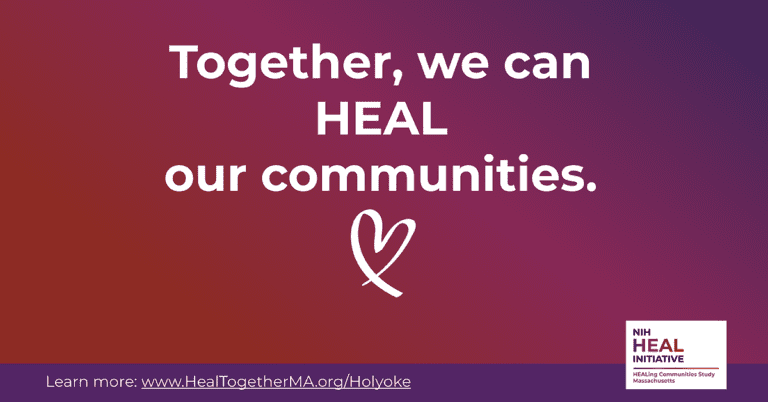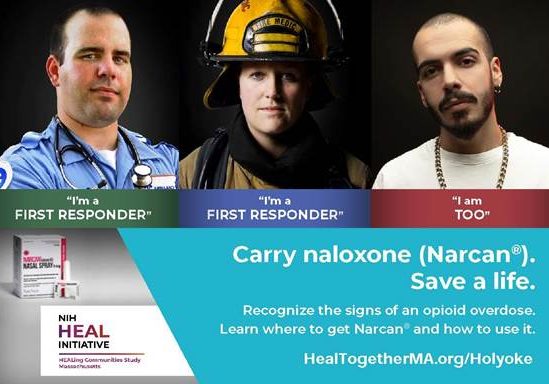
As part of the federal Department of Health and Human Services’ initiatives to address the opioid epidemic, the National Institutes of Health selected four research sites for the HEALing Communities Study in four states hard hit by the opioid crisis. This ambitious study aims to reduce overdose deaths by 40 percent over three years in selected communities by testing a set of proven prevention and treatment interventions, such as the distribution of naloxone to reverse an overdose and linking individuals in the criminal justice system with treatment for opioid addiction.
In Massachusetts, Boston Medical Center’s research team brings decades of experience treating people with substance use disorder to ending the opioid overdose epidemic across the Commonwealth. In collaboration with HEAL communities’ grassroots coalitions, the coalition is committed to bridging the gaps that prevent people with opioid use disorder from accessing quality care and treatment. The progress and findings from this research study will inform evidence-based solutions to reduce opioid overdose deaths.
In Western Massachusetts, this initiative is focused on the city of Holyoke. Boston Medical Center has an $800,000 grant committed to the effort, of which the Hampden County Sheriff’s Office and the Holyoke Safe Neighborhood Initiative are contributing.
More than $350 million will support the multi-year study under a cooperative agreement supported by the National Institute on Drug Abuse (NIDA), part of the National Institutes of Health. The study is being carried out in partnership with the Substance Abuse and Mental Health Services Administration (SAMHSA), which provides support for many of the local prevention, treatment, and recovery support services to be studied. The study is part of the NIH HEAL (Helping to End Addiction Long-term) Initiative, a bold, trans-agency effort to speed scientific solutions to stem the national opioid crisis.
As part of the program’s first round of focus, Holyoke is the sole Western Massachusetts community of focus. In 2021, the initiative aims to expand to focus on Springfield, Pittsfield, North Adams, Belchertown, Ware, Greenfield, Athol, Montague, and Orange. For more information on the initiative in Massachusetts, visit the official website here.
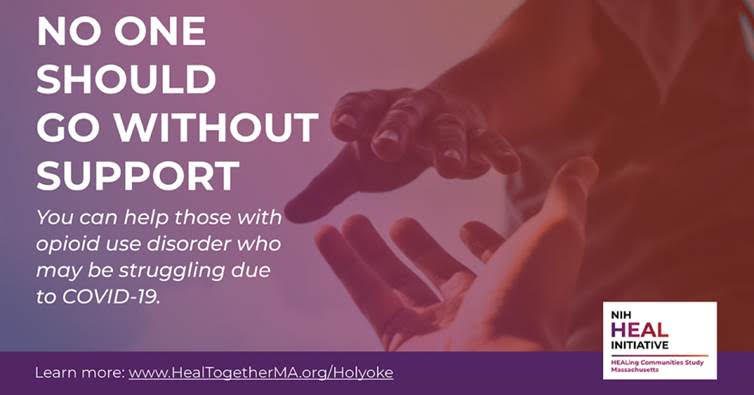
6 Ways to Support People with an Opioid Use Disorder during the COVID-19 Pandemic
- Get trained and carry Naloxone (Narcan®) to reverse an overdose. Learn how: www.HEALTogetherMA.org/Holyoke
- Call them. Offer compassion, encouragement, and support.
- Encourage them to seek treatment (if they are ready) and to seek prevention services at a local syringe services or harm reduction program. Tapestry is one program that can assist with harm reduction, you can reach them at https://www.tapestryhealth.org/overdose-prevention-services/
- Encourage those already in treatment to stay engaged or engage in treatment by calling their provider about telehealth appointments and take-home medication. Folks can get directly connected to the Holyoke Health Center and Holyoke Medical Center at:
- http://www.hhcinc.org/en/services/center-for-recovery-support
- https://www.holyokehealth.com/services-specialities/comprehensive-care-center
- Connect them with organizations offering virtual recovery support. One organization that provides virtual recovery support in Holyoke is Hope for Holyoke, you can contact them through their Facebook page at https://www.facebook.com/HFHRC/
- Learn how COVID-19 uniquely affects those with opioid use disorder. Start here: https://bit.ly/3dIkngr
We need to look out for each other, now more than ever. People with opioid use disorder may be at increased risk of overdose during social distancing. There is no better time to get trained and keep naloxone (Narcan®) at home. You could save a loved one’s life. Learn how at Tapestry Health.
https://www.tapestryhealth.org/overdose-prevention-services/
You can also get Narcan from any local pharmacy, you DO NOT need a prescription, and often there is no co-pay. Both Holyoke Health Center and Holyoke Medical Center also provide Narcan in Holyoke.
http://www.hhcinc.org/en/services/center-for-recovery-support
https://www.holyokehealth.com/services-specialities/comprehensive-care-center
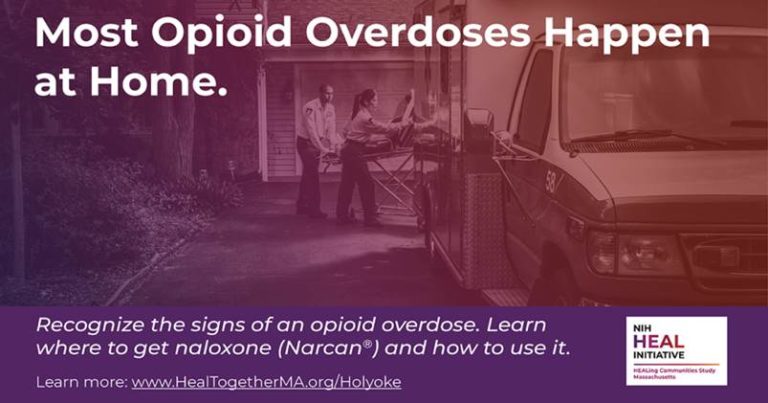

Social distancing puts people with opioid use disorder at increased risk for overdose-especially those who were recently released from jail, residential treatment, or a hospital. If you know someone who may be at increased risk, encourage them to get naloxone (Narcan®), learn how to use it, and to tell others where they keep it in case they overdose. Start here: www.HealTogetherMA.org/Holyoke
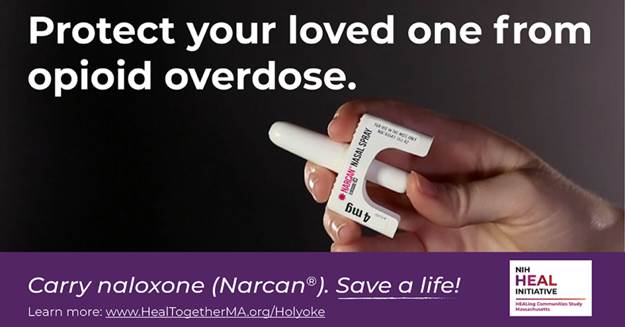
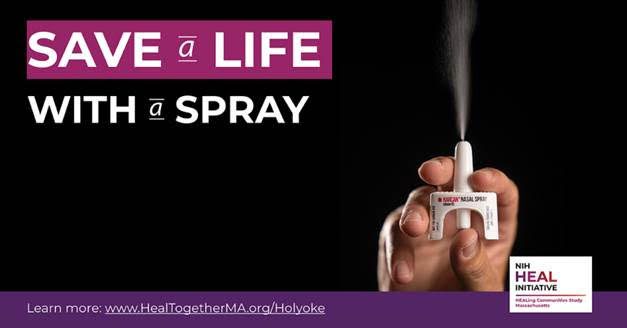
If you have a loved one who struggles with opioid use disorder, have naloxone (Narcan®) nearby. Encourage your loved one to be trained, carry naloxone (Narcan®), and tell their friends where they keep it in case they overdose. Learn more: HealTogetherMA.org/Holyoke or at https://www.tapestryhealth.
If you use opioids (like heroin, fentanyl, or prescription painkillers in ways other than prescribed) and were recently released from jail, residential treatment, or a hospital, you may be at risk for an opioid overdose. Get naloxone (Narcan®) and learn how to use it. Be sure to tell your friends where you keep your Narcan® and teach them to use it in case of an overdose. Learn more: HealTogetherMA.org/Holyoke https://www.tapestryhealth.
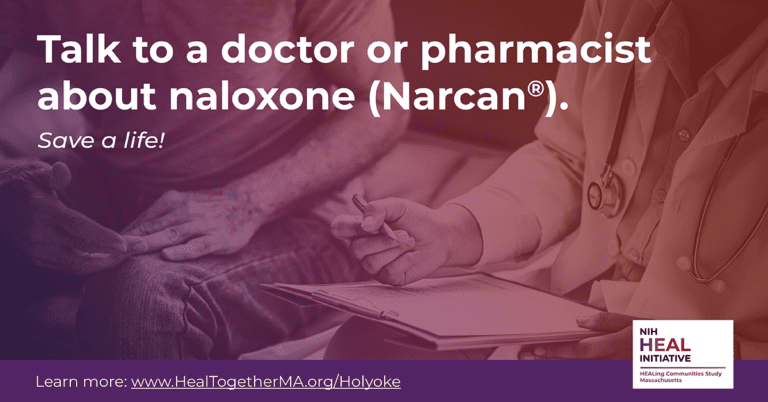
If you use opioids (like heroin, fentanyl, or prescription painkillers in ways other than prescribed), talk to your doctor or pharmacist about Naloxone (Narcan®). It can save your life. Learn more: HealTogetherMA.org/Holyoke, http://www.hhcinc.org/en/
Don’t allow the Covid-19 pandemic to impact the progress our community has made to address the opioid crisis. People who struggle with opioid use need our support now: HealTogetherMA.org/Holyoke, http://www.hhcinc.org/en/
